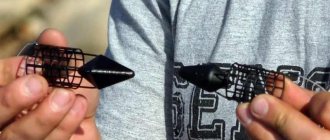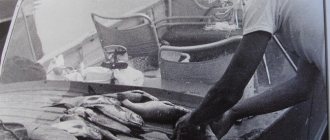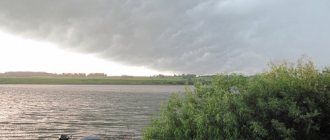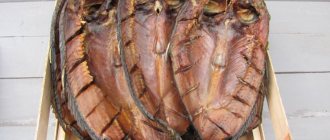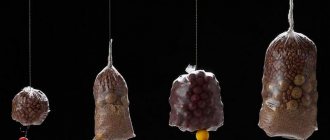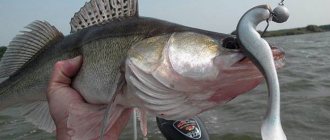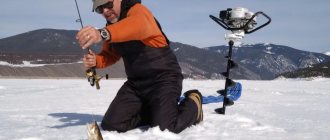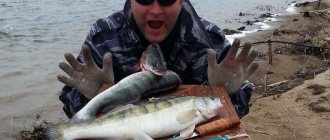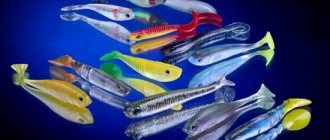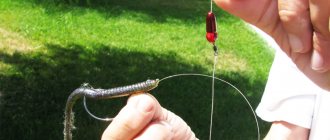Fishermen have long been interested in the questions: when and where do fish bite? The authors of many fishing guides give answers to them. But knowing and following these tips in itself does not give anything: it is necessary to take into account the specific situation (weather, time of day, nature of the soil, water transparency, current speed, etc.). Every time the fisherman has to decide for himself where to stand on the shore, where to cast, to what depth, what to fish for, how to fish, etc. This is where they can help fishing signs
, which will be discussed below.
Preparing for fishing
Signs for fishing
Fishing fees
- It is completely wrong to hastily prepare for fishing, especially just before leaving - there will be no bite.
- The other extreme is that if you prepare for a long time and carefully, going through all the little things in advance, the fishing is also unlikely to be successful.
- On the eve of fishing, you should not have sex, although on the other hand, some people even advise it, but this is apparently an individual sign. There is this interpretation on the Internet:
“Doing tedious housework and marital duties on the eve of leaving for fishing significantly increases the chances of returning with a rich catch. And vice versa, marital duty, performed outside the walls of the house and not with the spouse, reduces the intensity of the bite.”
- You definitely shouldn't shave. Washing is possible and even encouraged.
- It’s better to wear the right, “lucky” clothes; in any case, you need to be extremely careful when putting on new clothes. As well as taking new gear with you. It’s better to test both first on test fishing.
- Don’t quarrel with your family, especially your spouse, and don’t promise to bring a big catch.
- Do not eat anything fishy the day before.
- In the same way, check your things and car, so that God forbid, there isn’t a can of canned fish lying around somewhere.
- Fish ruined (not given away or eaten) from a previous fishing trip is the best way to come back with zero the next time.
- If you’re not in the mood for fishing, and you think that you won’t catch anything anyway, it’s better not to go!
- It is worth instructing your family not to wish luck, tail, scales, catch a big fish, etc. before going out.
Before leaving
- You can't fuss and rush.
- You cannot tell anyone where you are going, remembering that the merman loves secrets and respects people who can keep them.
- It’s better to screw it up quietly so that the wife or someone from the family doesn’t have time to wish good luck, happy fishing, say “bring some fish,” etc.
- It’s better not to return home if you forgot something. But if you forgot something very important and need to return, you need to look in the mirror and stick your tongue out at it.
On the way to go fishing
It is difficult to meet a priest, a cripple, or a nun these days. Therefore, other signs work:
- The dog barked - there will be no bite.
- Women you meet (especially if this is the first person you met), policemen, and hares do not contribute to pecking.
- The traffic cop stopped me and didn’t fine me - there won’t be a bite.
- On the contrary, not a big nuisance along the way - a fine from a traffic cop, a minor breakdown, some kind of hitch - contribute to the bite.
- It is very conducive to biting if you stop on the way to fishing and give someone a ride. If it’s a fellow fisherman, the bite will be crazy. But if you did this on purpose, or took money (even if the passenger put it in unnoticed), the omen will not work.
- On the way to fishing, you should be extremely careful when stopping at a fishing store. But if you have already stopped by, it is better that what you wanted to buy there is not in the store.
On the pond
- It is recommended to leave large bags and fish bags in the car.
- Once again inspect your things for fish dishes and canned food and also leave them in the car (if you accidentally took them from home).
- According to some comrades, it is also better not to take eggs and leave them in the car.
- It is better to leave the scales in the car too.
- Alcoholic drinks are an individual sign, everyone’s business is in full view of everyone. If you take a little, there may be no bite; if you take a lot, the consequences are unpredictable. Some people advise pouring a little vodka into the water before fishing. Someone should definitely take 100g. before starting fishing, etc.
- Under no circumstances should you lower the fish tank or landing net into the water before catching the first fish.
- Arriving at the place, you need to say hello to the reservoir, read a prayer, and say your cherished words. This is who likes what, who is closer to what.
- Before casting, you can spit on the bait, but this is only if you do not smoke and remember to brush your teeth.
- If something gets tangled on the first cast, it’s better to take another tackle - this one won’t bite.
- It is better to release the first fish, especially if it is small - such as mother, grandmother, aunt, etc. call - it works, with a probability close to 100%.
- If the first fish escapes, fishing is unlikely to be successful.
- If suddenly during the process of fishing a cat (dog) comes up to you and begs for a fish, be sure to give it.
- The butterfly sat on the float - wait for luck
- When fishing, you shouldn’t swear, quarrel with other fishermen and curious people - you won’t see a bite.
- In no case should you count, estimate in kg, and especially weigh the fish until you have finished fishing. There were a lot of cases from “a fish tank suddenly coming loose” to a fish tank being drowned (fishing from a boat). You should also not show the fish tank to others.
- Under no circumstances should someone else pick up your gear unless absolutely necessary.
- At the end of fishing, you need to thank the reservoir and read a prayer (again, for some, whatever you like best). Collect all things and garbage, otherwise there will never be a bite in this place again (works 100%).
- When telling others about your fishing trip, you must exaggerate your catch at least a little, otherwise next time you will catch less, and next time even less, and...
What to notice on the way to fishing: signs
Fisherman's beliefs say:
- Meeting a clergyman or nun, a policeman, a female representative, or a representative of the hare family on the way to a pond is extremely unfavorable for successful fishing.
- Hares and rabbits should not even be mentioned on the day of fishing - it is believed that these animals will interfere with a good bite.
- If you see a hare crossing the path in the river, all your fishing plans will definitely be ruined. To prevent this belief from coming true, let someone pass in front of you who did not notice the bunny, then you can continue your fishing trip.
Hares - to failure
- Meeting along the road a person with physical injuries or disfigured in appearance is considered a success for a fisherman.
- Doing a kind deed towards someone gives you a higher chance of making a big catch. Give a ride to a stranger, especially if he is an amateur fisherman, and luck will be on your side. Just don’t take money for the service provided, even when they persistently offer it to you - you’ll scare away Lady Fortune.
- Someone along the way wished you a good bite - most likely your catch will be jinxed.
The complexity of the fishing road will directly determine the outcome of the “event”: if your vehicle breaks down along the way, you are fined by a traffic cop, or any other problems happen, a good bite is guaranteed. If you avoid penalties when encountered by the road patrol, you can not count on a “fat” bite.
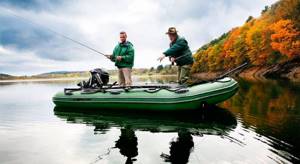
For the catch
On the way to the pond, you stopped by a shop to buy fishing accessories - luck will not smile on you.
Signs of a fish biting
Fishing signs
There are several factors that influence the fish bite. One of the decisive signs of successful fishing is stable atmospheric pressure. As special studies have shown, the highest catches occur when the pressure remains unchanged for 2-3 days or drops slowly. And, on the contrary, the bite worsens or stops completely if it increases and then decreases for 1-2 days. At high pressure, the best catch is at night (with stationary gear), and at close to normal pressure, during the day (with a spinning rod and fishing rod).
The phases of the moon also influence the activity of the inhabitants of the underwater world. During the new moon the bite improves. During the full moon (in spring and summer), the fish takes the bait mainly at dawn. It has been noticed that the best catches of perch and pike are during the full moon and the minimum phase of the moon, and the lowest ones are during the crescent moon. The strength and direction of the wind, water and air temperature one way or another affect the intensity of the bite. Long-term observations carried out in the Non-Black Earth regions made it possible to identify a number of patterns.
The fish are biting well:
- in winter - on first ice and with the approaching flood, in stable windless weather with moderate frosts without precipitation - throughout the day. Bream and roach are better caught during long thaws; perch, pike perch - early in the morning in clear frosty weather; burbot - during snowstorms with frost and winds;
- in spring - in clear weather with weak winds or during calm periods;
- in summer - during stable, cool weather with weak winds from the west and southwest. Pike is best caught with artificial bait at a wind speed of 0.3-5 m/s, and perch at 2-8 m/s. During calm periods, pike take better from the shore, and when the wind increases, in deep places in the reservoir;
- in autumn - in calm cloudy weather without precipitation, with a slight foggy haze.
The bite weakens:
- in winter - with increasing frosts (except for the bite of burbot, perch and pike perch) and with the beginning of snowfalls;
- in the spring - with profit and cloudiness of the water;
- in summer - with the beginning of flowering of reservoirs, increased heat or before bad weather, with turbidity of water in rivers (as its level in lakes and reservoirs increases, a short-term increase in the bite occurs, followed by a sharp and long-term deterioration);
- in the fall - with increased winds and the onset of inclement weather;
in all seasons - before the weather changes.
The fish are not biting well:
- in winter - during drifting snow, snowfalls with a sharp change in temperature;
- in the spring - with an increase in wind direction and a change in direction, cooling and the onset of inclement weather (with the exception of burbot);
- in summer - in very hot and dry or unstable weather with variable winds and drizzling rains;
- in the fall - during prolonged bad weather;
- in all seasons - with sudden changes in atmospheric pressure.
The fish don't bite:
- in winter - during strong snowstorms;
- in spring, summer and autumn - during stormy, gusty winds with downpours;
- in all seasons - with a sharp deterioration in weather.
Weather and fishing - is there a relationship: signs
- For centuries, fishermen have noticed that a good catch depends on weather conditions. For example, with high humidity, fish bite more actively. If it’s cloudy outside or there’s a little rain, a good bite is guaranteed, but in the heat you shouldn’t count on a plentiful catch.
- If the weather is hot, it is better to plan fishing for dawn and sunset.
- The lunar phase also affects the number of fish caught: on the 1st day of the lunar cycle the fish bite well, but on the full moon - poorly.
- Fishermen noted that a sharp change in air and water temperature in any direction has an adverse effect on the bite, but if the water warms up over a certain period of time - from cold to acceptable - the bucket will be filled with catch.
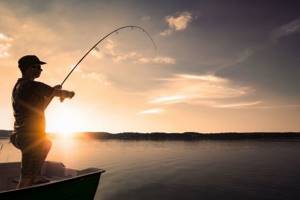
During a drought, when the water level drops, the catch can be poor, because... At this time, the water temperature can fluctuate sharply, which causes discomfort in the fish. A sharp increase in the level of the reservoir forces the fish to constantly move, so it also rarely gets hooked. A gradual increase in water level is the best conditions for fishing, as experienced fishermen say.
When looking at the barometer, remember:
- A catch is not expected due to sudden changes in atmospheric pressure, especially if there is a thunderstorm in the forecast.
- Pecking will be good if there is a gradual increase in blood pressure or stable blood pressure levels immediately after rain.
The strength with which the wind blows, as well as its direction, will affect the outcome of the fishing:
- On a hot day, gusts of cold wind from the north or east will bring comfort and a good catch to the fisherman; the same can be said about a cool day warmed by winds from the south or west.
- Powerful gusts of wind do not contribute to a successful bite, but a light breeze that causes ripples on the water surface will bring fish prey.
- The wind blows along the flow of the river - you can’t expect a great bite.
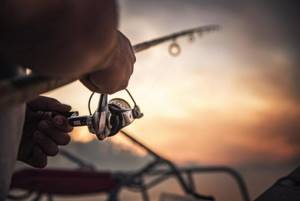
For the fisherman
The calendar will accept
The seasons and days leave their imprints on the behavior of fish. For example, it is believed that in early spring and late autumn the bite is more vigorous than in summer. At this time, as well as on cloudy days, fish take bait better in the middle of the day. In summer, the best bite occurs after dawn, the average bite occurs in the evening, and the worst bite occurs in the middle of the day. It has long been noted that the bite usually intensifies before and after spawning.
Spring
The beginning and end of snowmelt. The appearance of the first greenery. When the ice is still strong, and it lingers on ponds much longer than on rivers, there is good perch fishing using spoons and jigs. Pike takes excellent bait and lures. The roach bite improves. The flowering of willow usually coincides with the last days of ice fishing. After the ice breaks up and as the water clears, crucian carp begin to catch in shallow water. The bleak bites well at the surface of the water. With the budding of the willow buds, the spawning of pike begins. And when the birch buds bloom, sedge begins to grow - perch spawning begins, which will continue until the birch leaf completely blooms. Around the tenth of May, dandelion flowers bloom - a sure sign of spring feeding for pike. Before this, it is believed that it “changes its teeth”, or more correctly, it rests after spawning. At this time, the gudgeon bite also picks up. With the massive emergence of aerial insects, the post-spawning bite of roach and perch begins. When the viburnum blooms, it’s time for crucian carp to spawn, and when the rosehip blooms, it’s an excellent meal. The flowering of the rose hips usually coincides with the beginning of the carp bite.
- March 13 - Vasily the dropper will come, and winter will cry.
- 14 - Evdokeyushka the whistler. Winds and snowstorms whistle. Avdotya is red - spring is good too. Avdotya is beautiful - it’s been nicer all summer.
- 15 - if it’s snowing, then it’s a long wait for fresh grass.
- 29 - it bakes from above - it flows from below.
- Long icicles - spring has been delayed.
- There is fluff on the willow - spring on the sixth.
- The lark flew to the warmth, and the finch flew to the cold.
- Migratory birds in flocks - the cold quickly melted.
- April 7 - Annunciation. Third meeting of spring. The night is warm, then spring is friendly. It’s clear - towards the terrible summer.
- 15 — Tit-icebreaker. There is ice drift on the rivers.
- 24 - Antip-flood. If the rivers have not yet opened up, then the summer will be bad.
- May 1 - Yermil the Harnesser. It's time to harness the horse to the plow. If the sun rose clear the day before, then the summer will be clear. * If it’s warm on this day, then at the end of the month it’s cold, and vice versa.
- 13 - the sunrise is clear, it means the summer will be fine.
- 14 - Sidor-Borage, the day of sowing cucumbers. It’s cold in Sidora, and so is the summer. The swifts will arrive and bring warmth.
Summer
The best time to catch pond fish, most of which are lovers of warm waters. The bite worsens only during spawning and when the water “blooms” - the massive appearance of microscopic algae. When the first yellow leaves appear on birch and linden trees, perch gathers in large flocks - the time comes to catch it with live bait, which will last until the autumn cold. In summer, only the pike is depressed, the bite of which becomes more active on cool days, during a series of rainy days. In the summer, signs are often needed to help determine the weather for the coming days and even hours. Here are some of them:
- Before bad weather, swallows fly low, seagulls, ducks and geese often swim, mosquitoes bite more than usual, frogs croak loudly and the life of anthills is almost invisible. Water lilies and bindweed flowers are closing, lilies are rising late and do not fully rise from the water, and the flowering heads of thistles are almost not prickly.
- A sign of deteriorating weather may be: a sharp change in the direction of the wind or the fact that it does not subside by night (wait for precipitation), the sun sets into a cloud in the evening or hides in the clouds shortly after sunrise, the appearance of clouds in the evening or the rapid movement of cirrus clouds to the east, the absence dew at night or strong twinkling of stars. Before the weather improves, the flowers of bindweed and water lilies bloom (even on a gloomy day), but the flowers of hare cabbage (oxalis) close. “Columns” of climbing midges and mosquitoes begin to appear. Rainbow and weakening of the rain in the afternoon, a change in the wind clockwise - also to the bucket. If you have a receiver, then less interference is also a good sign. As does the drop in air temperature after cloudy days.
At home, after fishing and before it, it is useful to look at the barometer, which will tell you the weather change in the coming hours. The behavior and attitude towards food of the fish kept in the aquarium, including crucian carp or char, can also tell a lot. If you find yourself fishing without a watch, you can navigate by colors on a fine day. So, by 7 o’clock in the morning most flowers open, by 8 o’clock the bells open. By noon the sow thistle is already closing, by 13:00 the chicory flower petals begin to fold, and by 18:00 the water lilies are closing. Small clarifications need to be made to these indicators depending on the month.
- June 4 - Basilisk - nightingale day. The nightingale sings all night, which means it’s a fine day.
- 15 - Lukyan. On Lukyan, don’t go to bed early, but pay attention to where the wind is blowing: from the north - it will be a clear, cold day, from the south or west - it will be bad weather.
- 20 - Fedot, rich in thunderstorms. Chance of rain.
- 25 - Onuphrius the Great. If it rains, then it will be time for haymaking with rain.
- July 3 - Methodius the Sparrowhawk, usually with a thunderstorm. If not, expect a thunderstorm tomorrow.
- 7 - Ivan Kupala. If it rains, then the sun will appear in five days.
- 10 - Samson-senognoy. It rains on Samson - it rains for seven weeks.
- 15 - if the trees already have yellow leaves, then autumn and winter will be early.
- 21 - Prokop the Reaper. The beginning of the harvest and intense heat.
- 25 - Proclus - Great Dew. There is no dew on Proclus at night, which means bad weather.
- 29 - warm and clear - the harvest will be beautiful. If it rains, then vice versa - wait for damp days.
- August 1 - if it’s wet, then autumn is wet. If it’s dry, then autumn is dry.
- 2 - day of water cooling. If it is clear, then autumn will be clear, and vice versa.
- 11 - ripe oats turn green again - towards a stormy autumn.
- 16 - it may rain even in broad daylight.
- 17 - if it’s nice, then November is nice, and vice versa.
- 23 - if there is extreme heat or heavy rain, then this will happen all autumn.
- 27 - Micah. Quiet winds blow on Micah - for a clear autumn, if there is a storm - for a stormy September.
- 28 - the beginning of the young Indian summer (until September 11).
- 29 - third Savior. If the cranes have already flown away, then expect frost on Pokrov (October 14).
- 31 - first frosts possible.
Autumn
The leaves are turning more and more yellow. Pike bite more readily. On warm days, you can catch crucian carp with a bottom fishing rod, and less often, carp. With the onset of cold weather, before freeze-up, almost all life on the ponds freezes. But the perch begins to take excellent action on the first ice, and the pike does not lag behind it.
Many autumn signs are dedicated to September...
- In September, where the wind comes from, so does the weather. The warmer and drier September is, the later winter is. Or this: in the second half of September, a leaf from an aspen tree falls to the ground face up - leading to a cold winter. On the contrary - to warm. This way and that - to moderate.
- And old people also say: early autumn - late spring.
- September 1 - Andrey Stratilat - warm-hearted. Warm day - warm wind.
- 3 - if it’s clear, then there will be good weather for another month.
- 5 - Lingonberry loop. The beginning of the matinees. If the cranes flocked south to Luppa, then winter must be early. The cranes fly low, remain silent - expect bad weather soon.
- 6 - if it rains, then expect a dry autumn.
- 8 - frost in the morning - for an early and cold winter.
- 11 - Ivan Postny. Ivan came and took away the red summer. But if there is thunder, then the autumn will be warm.
- 14 - dry, then autumn will be dry. And it’s warm if the day is warm.
- 21 - Autumn. Second meeting of autumn. There are a lot of clothes on the bow, then expect a cold winter.
- 23 - fieldfare. If there are a lot of rowan trees in the forest, then autumn will be rainy, and vice versa.
- 24 - third meeting of autumn. Usually rain and slush. All warmth ends.
In October, fishermen are usually rare on the ponds. But October is also the month of popular long-term forecasts. Check:
- October thunder - for a winter with little snow.
- If there are a lot of nuts and few mushrooms, expect a harsh winter.
- The birch leaves did not fall until mid-October - the snow will fall late, but warm days are still possible.
- The pusher mosquito appeared in October - a sign of a mild winter.
- October 3 - Astafy. Astafiev's winds. If the siverko means it will soon be cold, the yuzhak means it will be warm, from the west - to wetness, and from the east - to the bucket.
- 4 - they say that from this day the weather does not change for four weeks.
- 14 - Pokrov. First winter. There are many signs associated with the Intercession. For example, if on this day the wind is from the east or north, then the winter will be cold; the wind from the south will be warm. If it’s a snowy day, then on Dmitriev’s Day (November 8) it’s the same. And if the Intercession is naked, then Catherine (December 7) is naked.
November for fishermen begins with the first fish. This is the time for excellent fishing for perch and pike.
- November 19 is a rich day with snow - the whole winter is snowy.
- 21 - if it’s warm, then don’t wait for winter until winter Nikola (December 19). Frost - expect heavy snow, fog - a thaw.
- 22 - if the cold and cold are on Fyodor Studite (November 24), then the winter road will remain until the thaw.
- 23 - fog in the morning, then wait for a thaw. If there is frost, there is frost.
- 24 - Fedot Studite. Since Studita the cold gets worse every day. If it’s warm, then the winter will be warm.
- 25 - If it rains or snows, then there will be a thaw before the Introduction (December 4).
- 29 - If the winds are violent, then there will be blizzards until St. Nicholas in winter.
Winter
Perch fishing is in full swing. Pike are also caught. In some ponds, crucian carp are also biting cautiously. But in January-February there are significantly fewer bites. There are days when you may not see them at all.
- December 1 - Winter indicator. As is the day, so is winter.
- 12 - if there is snow - there will be blizzards until Nikolin's day.
- 19 - Nikola winter. It's time for the first severe frosts.
- 29 - since the frost is strong, then it will remain for another twenty days.
- January 7—Christmas. Christmas time. If there is a thaw, then spring will be early and warm.
- 13 - if the wind blows from the south at night - the year will be hot, from the west - there will be an abundance of fish.
- 18 - strong winds from the south - the summer will be formidable.
- 19 - Baptism. Usually frosty. Clear, cold weather means a dry summer. If there is a snowstorm, then take revenge on it in three months.
- 21 - the last time the character of winter is judged on this day.
- 24 - if it’s warm, then it’s like early spring.
- 25 - Tatiana's day. If it snows, expect frequent rain in the summer.
- 28 - the wind is strong, so the year is damp.
In January, many signs are associated with the expectation of frost. So, if the snow creaks a lot under your feet, the clouds are low, there is a foggy circle around the sun, voices can be heard far away - everything is getting colder.
But in February, most will assume that snowstorms are coming. It’s not for nothing that this month in the Mari calendar is called the “month of snowdrifts.” So, expect a blizzard and snowfall, a blizzard and a blizzard, if crows caw loudly, sparrows hide under the eaves, and the samovar sings loudly and milk foams during milking.
- February 2 - crimson pre-sunset sun - for snowfall.
- 4 - the blizzard will charge and will not recede all week.
- 10 - Wind blower - for a wet year.
- 14 - there are stars at night - it’s a long wait for spring.
- 15 - the first meeting of winter and spring. As is the day, so is spring.
- 19 - there is frost, then spring is stormy, and summer is hot.
It’s impossible to count all the signs, so only those that may be useful to the fisherman are presented here. However, this selection is far from complete. Life itself will help you replenish it.
Signs for the seasons
You can fish all year round. For each season, fishermen have compiled a special calendar of signs. It takes into account the behavior of river inhabitants. So, at the beginning of spring and autumn, the bite is more energetic. In summer, the heat causes the fish to become lethargic. In June-July there is nothing to do on the river at noon. On the eve of spawning and after it, hungry fish rush to the bait.
Spring
The open water season starts again in March. Fishermen prepare their fishing rods and go to small rivers for roach. Spawning is still a long way off, so the fish are reluctant to bite at first.
To avoid having to sit all day on the shore in vain, it is better to know the signs of good and bad spring bite:
- earthworms have crawled to the surface - there will be warm rain and a fantastic bite;
- the cranes and larks returned - it was time for spawning;
- for the first time in the year the cuckoo will call - expect thunderstorms and active pecking;
- in the evening there are blue clouds in the sky - the weather will change, it is better to cancel fishing;
- the sparrows chirped loudly - clear weather would last for several days, the bite was guaranteed;
- fog creeps in at dawn - go fishing, you won’t regret it;
- red sunset - strong wind and weak bite;
- The bird cherry blossoms - catch a pike.
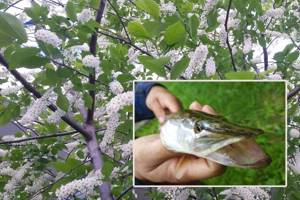
Summer
The difficulty of summer fishing is that the inhabitants of the reservoirs do not lack food. There is so much of it in rivers, lakes and ponds that the fish begin to be picky - they do not react even to the most delicious bait.
Summer signs about fishing:
- The rosehip has bloomed - spawning ends, the bite will intensify.
- The heat has a negative effect on fishing results, the water blooms, and it is more difficult for the fish to breathe.
- In hot weather, fish feed reluctantly. Catch it closer to night and in the morning, when the river inhabitants are hungry.
- On a cloudy day, the chances of catching increase.
Autumn
When going fishing in the fall, it is worth studying folk signs so that fishing is more effective. In such months, bream, pike, and perch are more likely to bite. On a fine day, crucian carp are caught on the hook. A successful fisherman will also catch carp. By November it gets colder outside, and life on the reservoirs comes to a standstill.
The main signs of autumn fishing:
- if the wind picks up at night, the bite is canceled;
- leaves have flown from the birch trees - the pike begins to “guzzle”, and the stronger the leaf fall, the greater the chances of catching a toothy predator;
- the colder the water, the lower the activity of the inhabitants of the reservoir;
- on a warm day, the fish stays closer to the shore, and when it rains, it hides in the depths.
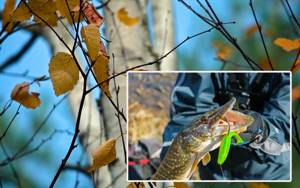
Winter
Winter fishing takes place in less comfortable conditions than in summer, but the pleasure is no less. When the reservoirs are covered with an ice crust, you can go to those places where you cannot reach without a boat on open water.
In winter, the most active bite is on the first ice and closer to spring. It is better to catch perch on a clear frosty day. In calm weather, when it is not too cold outside, go for rudd and bream. If you are not afraid of a snowstorm, during strong winds go out onto the ice for burbot.
Signs that promise catchy winter fishing:
- smoke from a fire or from a chimney rises “in a column” (straight up);
- Frost fell in the morning;
- at night the thermometer drops, and during the day it becomes relatively warm;
- calm weather.
When not to go on the ice:
- the wind blows strongly and changes direction sharply;
- drifting snow is spreading;
- It’s cold during the day, but warms up at night;
- atmospheric pressure has fallen and continues to decline;
- smoke goes along the ground;
According to signs, you cannot take out an ice auger and other accessories for winter fishing until there is ice on the reservoirs.
Weather signs
Signs of the weather
It will be dry and clear if:
- from early morning in summer it is windless and cool, and then the air is heated by the sun's rays and a weak easterly wind rises, which intensifies at noon and subsides in the evening.
- In the morning, slowly moving ragged cumulus clouds appear, and the sky between them is blue and deep
- During the day, cirrus clouds float across the sky, leaving in the evening;
- at sunset the color of the sky is golden or pale pink;
- at night, ravines and lowlands overgrown with bushes are covered with fog;
- It’s cold at night, and in the morning the grass is covered with dew, but with the sunrise it evaporates;
- the air temperature after the appearance of the sun rises even before noon, and then gradually decreases by the morning of the next day;
- the smoke from the fire rises straight up, the coals in the fire quickly become covered with ash, and midges curl in a column in the evening;
- swifts fly high in the sky;
- frogs scream loudly;
- the nightingale sings all night;
- the bees go for a bribe early in the morning;
- the rainbow quickly disappears after the rain;
- the spider is intensively weaving a web;
- seagulls land on the water;
- fish jump out of the water from lunch until evening;
- objects visible in the distance are obscured by haze;
- the circle of the sun at sunset, and the moon appearing at the same moment, take on an anomalous shape.
Bad weather is approaching if:
- cloudless, dry weather suddenly changes to cloudy and the air temperature drops;
- the wind abruptly changes direction, intensifies at night or during the day in the heat with partly cloudy weather subsides, and then blows in from the moving clouds with enormous force;
- at approximately the same air temperature at night and during the day, at night it becomes humid and stuffy; -the sky is covered with a translucent veil of clouds;
- Rainbow circles appear around the sun;
- there is no dew on the grass; the wind suddenly changes direction;
- the smoke of the fire spreads along the ground and the coals in it smolder brightly;
- swifts sweep over the water itself;
- The crows are cawing annoyingly, almost all the birds are quiet and hiding;
- frogs croak in unison;
- the fish stops biting;
- plants cover flowers to protect pollen from moisture;
- The rainbow lasts a long time after the rain.
Rain and thunderstorms are expected if:
- the wind increases towards night;
- it hovers in the air and becomes stuffy;
- the morning dawn is crimson-red;
- swifts fly low over the water;
- the sparrows became ruffled during the day;
- many insects fly towards the fire, and mosquitoes and midges are very aggressive;
- bees fly near the hives;
- all flowers have a strong smell;
- catfish, loach and char, which usually lie calmly at the bottom of the reservoir, rise to the surface and splash.
The weather will improve if:
- the rain sometimes intensifies to the point of downpour, and when it rains the roosters crow;
- gray clouds rise upward and darken, motionless cirrus clouds are visible in the gaps in the sky;
- the gusty wind subsides in the evening;
- by night it becomes noticeably colder than during the day;
- grasshoppers chirp loudly in the evening.
Folk signs about the onset of rain and windy weather:
- light rain in the early summer morning - excellent weather during the day;
- the rain, which began to fall at noon, will continue until night;
- rain and sun - bad weather;
- rain that comes in large drops will pass faster than small rain;
- after heavy rain the sky quickly clears - it will rain again soon;
- The water in the pond is foaming - rain is likely in the near future.
Fisherman's Philosophy
In general, fishermen, by their nature, are known to be peculiar people. He also has more than enough superstitions. For example, there is fishing etiquette, customs and traditions. And there are countless signs - both based on real experience and analysis of facts, and obviously of a superstitious kind, based on something unclear.
Superstitions are perceived by many as a given - a life axiom, which, as we know, does not require proof. However, regardless of whether the fisherman believes in omens or not, information about such cause-and-effect relationships is necessarily stored in the depths of his consciousness. And as soon as the realization occurs that events are developing according to the scenario prescribed by some sign, a regiment of superstitious people arrives.
Recommended reading: Fishing with a float rod
The author of this compilation and creative material himself is moderately superstitious, but is inclined to believe that the roots of superstitions lead to people’s attempts to find patterns in the world of chance.
From a scientific point of view, superstition is a prejudice consisting in the fact that an individual accepts as reality unknown forces that can foretell events and even influence them. In this case, signs occupy a special place: certain events are assigned prognostic significance.
From the point of view of psychology, the exceptional stability of superstitions is due to the fact that cases of their confirmation are firmly recorded, and facts of obvious fallacy are repressed. Superstitions have their roots deep in the past, and at the same time are unsystematic in nature. The desire to look into the near future, avoid unfavorable situations, and others are characteristic of the human psyche and can contribute to the spread of superstitions, especially in extreme circumstances.
Actually about signs and superstitions. The following list of fishing superstitions gives only a general idea of the pagan background of fishing, and is not complete or comprehensive.
Fishing dream book
- If you had a dream in which a fisherman appears, this portends well-being and prosperity
- If in a dream you see fishing gear, in particular hooks, then life will give you the opportunity to rise several steps higher. The main thing is to be able to take advantage of this chance correctly.
- If you dreamed of a fishing net, then many small everyday joys await you. If the network is torn, then be prepared for disappointment.
- If you dreamed that you went fishing, then this dream may mean that your soul requires a change of scenery.
- A dream in which your fishing is not going well means that you only need to be patient to achieve the desired result.
Signs when returning
When you return home, you can show off your trophies. There are also signs about this:
- When talking about the fish you caught, exaggerate its number and size. This will help you catch a bigger one next time.
- All prey must be eaten. If you throw something away, you can no longer count on a rich catch.
Fishing is accompanied by many beliefs. It is impossible to remember them all, and it is hardly worth doing. Choose a couple of signs that you believe in, and may you always have an excellent bite.
How to ensure the favor of fortune while fishing?
Preparation and travel to the reservoir is just a prelude to the main process. What should you remember when fishing so as not to be disappointed with the result?
- Upon arrival at the place, do not rush to take out all the bags and sacks from the car. Get only the necessary gear and start fishing. Don’t forget that the net is not lowered into the water until the first fish is caught.
- When arriving at a river or lake, you should show courtesy and say hello to the body of water. Also, you should not use foul language or quarrel with neighbors and friends. Fishing luck does not like quarrelsome and grumpy individuals.
- There are also special beliefs regarding gear. They must not be given into the wrong hands. Fishing equipment that gets tangled during casting should not be reused. It is also undesirable to take a fishing rod that you have previously sat on or stepped on.
- Fishermen have deduced several true signs about the bite. The more gear you bring with you, the less likely it is to bite. According to the law of meanness, large fish always bite on the thinnest fishing line. If the fish stop biting, then it’s time to take a break and refresh yourself.
- Particular importance is attached to the first fish. If it turns out to be small, then it should be released so that it can bring larger relatives with it. The first bite that falls off the hook, like the ruff that was the first to catch the hook, warns that there will be no successful fishing today.
- Be sure to treat a stray cat or dog with fish. If you don’t do this, then fortune will turn away from you, because it doesn’t like greedy people.
- Never weigh or count your catch until after fishing. Signs tell us that those who keep strict records of their achievements will certainly lose everything before the end of the fishing trip.
- If you drink alcohol while fishing, be sure to splash some into the water and share it with the water spirit. Otherwise, he will plot all sorts of intrigues for you and ruin the whole fishing trip.
